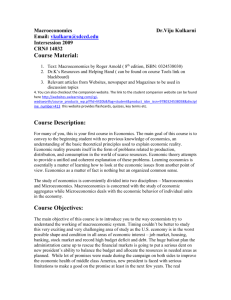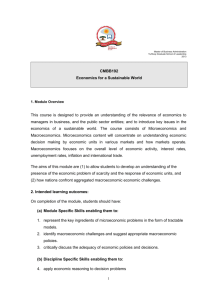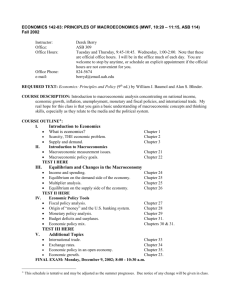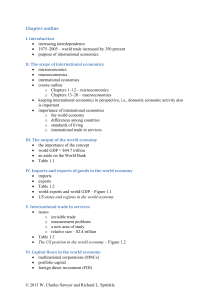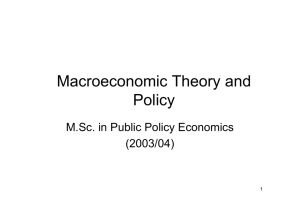syllabus
advertisement
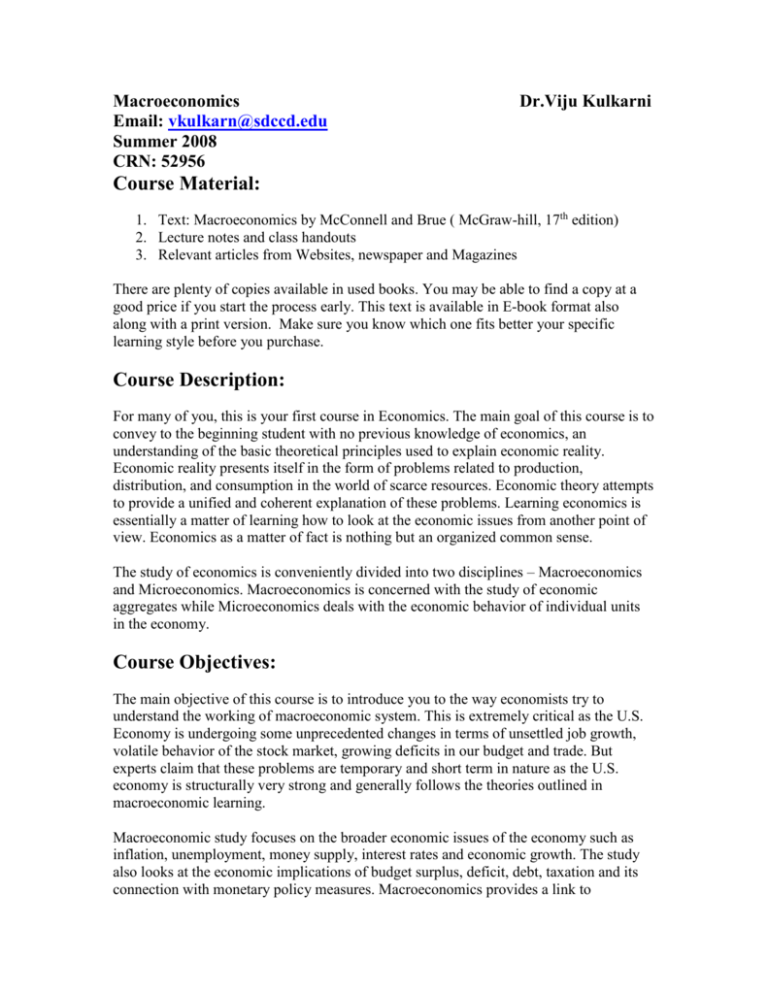
Macroeconomics Email: vkulkarn@sdccd.edu Summer 2008 CRN: 52956 Dr.Viju Kulkarni Course Material: 1. Text: Macroeconomics by McConnell and Brue ( McGraw-hill, 17th edition) 2. Lecture notes and class handouts 3. Relevant articles from Websites, newspaper and Magazines There are plenty of copies available in used books. You may be able to find a copy at a good price if you start the process early. This text is available in E-book format also along with a print version. Make sure you know which one fits better your specific learning style before you purchase. Course Description: For many of you, this is your first course in Economics. The main goal of this course is to convey to the beginning student with no previous knowledge of economics, an understanding of the basic theoretical principles used to explain economic reality. Economic reality presents itself in the form of problems related to production, distribution, and consumption in the world of scarce resources. Economic theory attempts to provide a unified and coherent explanation of these problems. Learning economics is essentially a matter of learning how to look at the economic issues from another point of view. Economics as a matter of fact is nothing but an organized common sense. The study of economics is conveniently divided into two disciplines – Macroeconomics and Microeconomics. Macroeconomics is concerned with the study of economic aggregates while Microeconomics deals with the economic behavior of individual units in the economy. Course Objectives: The main objective of this course is to introduce you to the way economists try to understand the working of macroeconomic system. This is extremely critical as the U.S. Economy is undergoing some unprecedented changes in terms of unsettled job growth, volatile behavior of the stock market, growing deficits in our budget and trade. But experts claim that these problems are temporary and short term in nature as the U.S. economy is structurally very strong and generally follows the theories outlined in macroeconomic learning. Macroeconomic study focuses on the broader economic issues of the economy such as inflation, unemployment, money supply, interest rates and economic growth. The study also looks at the economic implications of budget surplus, deficit, debt, taxation and its connection with monetary policy measures. Macroeconomics provides a link to understand many global issues such as trade and payments, free trade issues and foreign exchange market. In addition to these conventional macroeconomic topics, we also focus on looking into the economic implications of current social issues such as global warming, recycling, outsourcing, health care and immigration in our discussion. By using basic macroeconomic concepts. This should make our learning more meaningful. This list could be expanded, but it suffices to give you an idea of the variety and depth of issues we will discuss in this course. In the class we study not only economic theories but also apply them to many specific cases to understand the current economic issues that presidential candidates on both sides are raising. For example, issues like why enough jobs have not been created even when economy is said to have recovered? How is this related to the concept of “Outsourcing”? Why is Federal Reserve interested in raising interest rates when unemployment is still an issue? How did the budget surplus turn into deficit? Why dollar value is is declining overseas and what does this mean to the future of dollar in the international market? Why are we so hesitant to stop trading with China inspire of the repeated problems with the tainted toy issues? All these and many other related issues can be explained and understood better by using economic theories. Testing and Grading There will be 2 quizzes (Warm up and Final) 2 tests (Mid term and Final) and 4 discussion topic postings (read the specific instructions on this below) in this jet speed 4 weeks course. Each test will count 240 points towards the grade and each quiz will count 80 points and you are graded for the maximum of 700 (480 points from tests, 160 points from the quizzes and 60 points from weekly discussion posting) points. Participation in weekly postings is mandatory. Please read the specifics on discussion postings below. Each test will be 60 multiple choice questions from the selected list of chapters covered each week. Each quiz will contain 40 MC questions the selected chapters as listed below. I have provided you below with the chapters to read, questions to focus on for quiz and test. You can also check out my Resources guide ( Dr.K’s resource link on my home page) to help you understand the material better and prepare for test. To get most from the course in this short period of learning, first read the sections from my resources and then read the text. The schedule we have set up for tests stays valid unless I inform you otherwise. All the test dates, material to be covered in each test and the study questions to focus on are all listed under schedule link on the home page. I will announce the changes, if any in the announcements and by email but you need to pay attention to what goes on and check the announcements and email frequently. Talk to me freely if you have any questions, concerns and problems. Grade Distribution: 89% – above 79- 88% 69 – 78% 59- 68% Below 59% A B C D F Final grade is based on a straight scale in accordance with district’s policy. But the borderline cases are decided to your advantage based on your interest, commitment and quality of your writing in the discussion board postings. If you do not participate in the weekly discussions actively, I will lower your grade by one level. Good luck. This is a fun and rewarding class with lot of information that are used in your future decision making. Posting on discussion – Participation in threaded discussions Students must participate in all threaded discussions. I will post the topic relevant to current issues in economics on the discussion Board on the first Monday of each week and you must post your thoughts on the topic by Sunday night ( 10 pm) of each concluding week. You are expected to do one original posting with your thoughts and comments (10 points) on the posted topic and one reaction to others’ posting ( 5 points). You cannot do both postings on the same day. They must be done on different days during the week. I also discourage you from doing the posting at the last minute on the last day as I believe that last minute posting is an indication of poor planning and poor performance. Ignoring this will result in lower grade. Anything posted after the due date and time will not get any credit . You will be graded on your participation and the quality (or thoughtfulness) of your contribution to the postings. Quality can come in the form of making insightful comments, asking probing questions, using your critical thinking skills, listing references you used among other things. Your posting must be at least half a page length. Do not wait until the last minute post your comments. Please Note: To make it convenient and easy for you, I have set 10 pm on Sunday of each week as the deadline for all submissions. Please remember, this is a 4 week course moving at a jet speed covering the entire semester material. This class is fun and very rewarding but you must keep up with the reading, postings and preparing for the test each week to reap the maximum benefit. Quiz/test dates, material and study questions to focus on, along with the specific dates to complete the other activities are listed in the “Schedule” link on the home page. Extra Credit Project: There is also an extra credit opportunity for you to earn additional 25 points. Read more about the project and specifics under “Student Resources” link on the home page.
